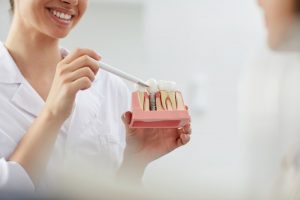How Do I Know If I’m a Good Candidate for Dental Implants?
November 24, 2021

If you have missing teeth, your research for replacement options is liable to lead you to a singular conclusion – dental implants are the best option. But are they YOUR best option?
From preventing bone loss to restoring bite force to maintaining the shape of your face, there are so many benefits with a commitment to dental implants. A major factor in the decision is whether or not they are right for you specifically.
Keep reading to learn if you are a viable dental implant candidate from your dentist in Duncanville.
No Excessive Alcohol Use or Smoking
When you use alcohol or tobacco it can decrease your body’s ability to heal properly. Excessive alcohol consumption can cause dry mouth, inhibit blood clotting, and even lead to bone loss. Smoking increases your chances of developing gum disease and can also contribute to bone loss, potentially resulting in implant failure.
General Health Outlook Is Good
A person with a chronic disease is at greater risk of dental implant failure. For example, patients with diabetes have a higher rate of implant failure because their condition interferes with osseointegration and slows the healing process. Heart disease and sleep apnea can interfere with anesthesia, which could create complications during surgery. Therefore, a dental implant candidate should ideally be free from chronic diseases.
Bone Density Is Adequate
A patient must have sufficient jawbone density for a successful implant procedure since they are anchored into the jaw. The fusion of implants to the bone, aka osseointegration, is a crucial part of the process, as it ensures your implants stay in place permanently to provide unmatched stability and a strong bite force. However, if you don’t have an adequate amount of bone, your implants can become loose or fail. Fortunately, you can undergo a bone graft to create more area for implant placement, thus improving your candidacy.
Gums Are Healthy
Dental implants derive their stability from surgical insertion into the jawbone and the subsequent osseointegration. Your gums help keep them firmly anchored. However, if your gums are compromised in any way, they won’t effectively hold the titanium post in place. Therefore, patients with gum disease will need to undergo periodontal therapy before becoming eligible for implants. Otherwise, bacteria can attack the bone supporting the implant, causing it to fail.
Oral Hygiene Is a Priority
For dental implants to succeed and for the surrounding gums to be healthy, good oral hygiene is crucial. The implants are relatively low maintenance once they are fused to your jawbone, but proper dental care is necessary to prevent complications. Brushing your teeth twice a day, flossing daily, rinsing with mouthwash, and regularly visiting your dentist will help you enjoy your new smile for years to come!
If you meet all these criteria, congratulations, you can now make a smile-changing decision. If not, you still have the opportunity to make strides in your oral health to the point where you can be deemed an excellent dental implant candidate.
About the Practice
At Bear Creek Family Dentistry, our team consists of general dentists, as well as specialists in pediatric dentistry, orthodontics, oral surgery, and prosthodontics. We treat every patient the way we would want to be treated – with compassion, courtesy, and respect. In order to optimally utilize our modern dental equipment, our doctors and staff devote many hours each year to continuing education so that we keep up with what is an ever-evolving industry. If you are interested in dental implants, we perform dental implant placement and also offer dental implant-supported dentures, as well as dental implant-supported crowns and bridges. To schedule a consultation and know for sure about your implant candidacy, visit our website and select one of our 12 DFW office locations that works best for you.
No Comments
No comments yet.
RSS feed for comments on this post.
Sorry, the comment form is closed at this time.
